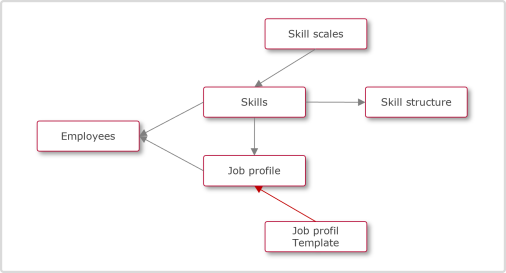Skills include proficiencies such as team play, stenography or negotiating skills. They can be assigned to courses, course templates and learning paths, which serve to enhance the selected skill by a specific degree. They can also be assigned to users who have reached, or are to reach, a specific degree.
A meta tag allows to determine that users are awarded the target value of the skills assigned to a course or learning path automatically upon completing the course or learning path.
Skills can be combined into job profiles that describe the proficiencies required to carry out a specific task. For instance, the job profile "Salesmanager" requires the skills "Customer communication" and "Self-dependency".
For search purposes, personnel resources can also be assigned skills and job profiles.

This function is only available with the licence or the add-on component "Competency Management."
Functions and Skill Management
New
There are a number of options for creating and editing skills.
Skills can be assigned to objects or users or used as a basis to search for objects. Depending on the context, levels that were achieved or that are to be achieved can be entered. The evaluation type determines whether the given level is taken from a fixed skill ranking (such as "Novice", "Advanced", or "Expert") or corresponds to a value between 0 and 100 points, or if a combination of the two is available. The option not to evaluate a skill also exists.
Evaluation type
If an evaluation type for a skill was selected, evaluation can be skipped while assigning the skill to courses, course templates, learning paths and resources, depending on the configuration.
Depending on the chosen evaluation type, various expiration options are available: If a skill with a specific level has been achieved, the learned proficiencies can decrease again over time. This can occur at a determined point in time or regularly, at set intervals. The skill will be reduced by a determined number of levels or points, or it expires completely.
The determined expiration rules can be further modified for each given object upon assigning the skill to courses, course templates and learning paths. Upon saving a skill that is already in use, it can be determined whether the new rules apply to all uses of the skill or whether the rules specific to a given object are to be maintained.
Confirmation mode
The selection of a confirmation type has an effect when staff members assign skills to themselves. Depending on the confirmation type, the skill will automatically count as achieved (confirmed), will require confirmation by a superior or administrator, or confirmation by competency evaluation that the learner and supervisor confirm.
Skill level completion logic
When the “Confirmation by competency evaluation” confirmation mode is enabled, the “Percentage of Yes answers needed to pass the skill level” configuration allows marking a skill level as complete based on a specified percentage of Yes answers across all related competency statements. The logic sets the minimum requirements for passing a skill level within a competency evaluation. The result is displayed in the learner and supervisor front-end for final confirmation, approval, or rejection of the level confirmation. No entry is equal to 100%.

Example: If a 75% Yes threshold is set and the skill has four competency statements, at least three must be ‘Yes’ to achieve a positive result.
Skill Scales
Skill scales can be assigned to skills as evaluation options. They can be selected from a list of existing skill rankings or created manually per skill. Depending on the configuration, it is also possible to have a ranking integrated by default upon creation of a skill. If a fixed skill scale is used, it can be refined or modified for each skill. A sample application is the use of a three-level scale with the levels beginner - advanced - professional, which is already selected for new skills. The three levels can now be expanded upon with further descriptions that elaborate, for instance, on what "Advanced" means for a given skill.
NewEdit
Edit
Delete
Delete
Clearances
Clearance
Global Functions and Related Topics
Search in ManagersSkill ScalesSkill Structures
